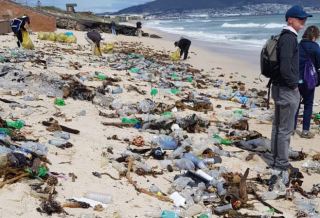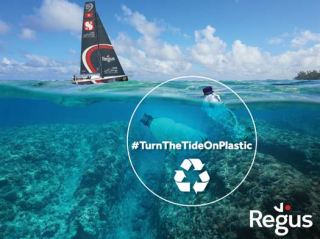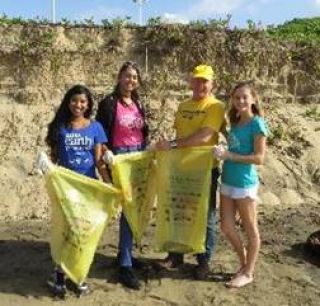Initiative to Capture Cape Town’s Trash Before it Hits the Coast
The City of Cape Town has joined key players and interested groups in the first of many meetings, to investigate ways to remove garbage from Cape Town’s rivers so it doesn’t make it into the ocean.
Included at the meeting were Plastics|SA, the South African Department of Environmental Affairs, Woolworths, The Percy Fitzpatrick Institute of African Ornithology, The Polyolefin Recycling Company (Polyco), Cape Town non-profit organisation Clean C, local digital marketing firm Gnu World Media and several other groups.
John Kieser, Sustainability Manager of Plastics|SA and facilitator at the meeting, says the main goal of this network will be to share information, ideas and resources for minimising the amount of litter that washes into the city’s seas.
Black River in Observatory is the first focus area. Already, Plastics|SA and the City of Cape Town’s Environmental Management Department have set up a system to remove litter floating on the river – 80 to 90% of which is plastic. A team gathers plastic at designated areas once or twice a week and takes it to Bokmakierie Primary School, where it’s separated and sent off for recycling.
In KwaZulu-Natal, the Department of Environmental Affairs is currently conducting similar projects, focusing on the Umgeni and three other rivers. If all goes to plan, the Department may consider funding similar Expanded Public Works Programme (EPWP) projects in Cape Town.
In the meantime, Kieser says the Cape Town network of groups will prevent people with the same vision – keeping our rivers and thus our oceans clean – from working in silos.
“It’s great that the plastics industry is facilitating this kind of dialogue,” says Gregory Player of NPO Clean C. With support from Cape Town-based digital marketing firm Gnu World, Clean C is working on a similar project – installing litter-catching nets over stormwater drains in the 4 kilometres between Sunset Beach and Milnerton Lagoon. Large amounts of household and general refuse – mostly plastic – washes into the lagoon from drains in areas including Joe Slovo, Sanddrift and Milnerton and then ends up on the beach and in the ocean.
The project would require a trained team of five to do regular clean-ups, and equipment like wheelie bins, uniforms, and a truck to transport the collected garbage.
Player says many EPWP projects run only in the short term and that most of the achieved improvements are lost once funding ends. “We’d like sponsorships to get the project off the ground – but once it’s implemented, we will move towards making it self-sustaining,” says Player.
Taryn Nightingale, PR and outreach specialist at Gnu World Media, says, “People forget that we form part of the same ecosystem the rivers, plants, oceans and animals do. We need to change how we view plastic and its value. When it’s recycled, there’s the opportunity to earn money from it, but when thrown away, it has grim consequences.
”Currently, only 5% of South Africans recycle. Mandy Naudé, CEO of Polyco, says the main reasons for this are a lack of education, incentive and infrastructure. “We must make it convenient for South Africans to recycle.” The organisation recently launched PACKA-CHING, which aims to increase recycling in informal settlements and lower-income areas. It has been running in Langa for about a year, and has resulted in the removal of about 240 000 kilograms of plastic since its inception.
Anyone interested in joining this network of plastic catchers or in helping in some way can contact John Kieser at This email address is being protected from spambots. You need JavaScript enabled to view it..
VOLVO Ocean Race: Making Big Waves in the Race for sustainability
The Volvo Ocean Race organisers are using their combined global clout to “turn the tide on plastic.” Arriving in Cape Town, South Africa, towards the end of November on Leg 2 of the global race, the world’s longest and most competitive professional sporting event has an inevitable environmental footprint, as well as an inescapable opportunity to raise awareness of the urgent need to combat plastic pollution and its effect on Ocean Health.
By signing a Sustainability Charter, the Volvo Ocean Race leadership committed to the sustainable operation of all its activities, down to the first-time use of a hydro-generator to reduce the use of fossil fuels. Activities covered in the charter include the Race Village, transport, Greenhouse Gas emissions, engagement and advocacy. The campaign’s strategic objectives are to: 1. Maximise impact, 2. Minimise their footprint and 3. Leave a positive legacy. Their progress and success is monitored throughout the 9 month race.
Volvo Ocean Race CEO Mark Turner explained the three pillars of the Volvo Ocean Race strategy. “Firstly, we have to minimise our own impact and that’s true right across all of our operations. Specifically, we are trying to reduce, or eliminate where we can, single use plastics in our Race Villages and our own operations because that problem in its own right is a major one for the health of our oceans.”
Their call-to-action to businesses, governments and individuals in each port is to join them in amplifying the race’s efforts to reduce the approximately 8 million tonnes of plastic dumped in the sea every year, through local initiatives such as beach cleanups, education and the high-profile Ocean Summit in 7 of the locations.
And Cape Town, known for its pristine protected coastlines, will be no different. Host, the V&A Waterfront, is paving the way for the various sustainability initiatives from 24 November to 10 December. The planned activities range from a beach cleanup, TEDX talks, craft-making and design using from recyclable plastics, to the esteemed Ocean Summit from 7 to 8 December and Ocean Life Festival in partnership with the Dutch Consulate General.
Joanne Bushell, Regus country manager for South Africa says, “Regus has a particular interest in this race due to the Sun Hung Kai/Scallywag which we co-sponsor. Like the Volvo Ocean Race, we are a global brand with a global responsibility towards sustainability. Our Black River Park office in Cape Town, is one first office precincts in the country to receive the Green Building Council of South Africa (GBCSA) certified Green Star existing building ratings for all of its 8 buildings. Sustainability is fast becoming a key differentiator for companies and entrepreneurs alike and we are proud to be associated with the Volvo Ocean Race.”
Find more details about the programme and sustainability initiatives from 24 November to 10 December here or at www.volvooceanracecapetown.com
CONTACT PERSON:
Louise Rebstein
Regional Marketing Manager – REGUS
This email address is being protected from spambots. You need JavaScript enabled to view it.
+2711 534 8697 | +27 766776397
FOR MEDIA ENQUERIES:
Gidgette Osborne
This email address is being protected from spambots. You need JavaScript enabled to view it.
+27 82 574 2308
SA PLASTICS INDUSTRY LAUNCHES OPERATION CLEAN SWEEP
The South African plastics industry recently launched Operation Clean Sweep on World Oceans Day (8 June 2017) at the uShaka Marine World, Durban.
According to Douw Steyn, Sustainability Director at Plastics|SA, the primary goal of the campaign is to stop plastic pellets, flakes and powder used in the plastics industry, from reaching the sea.
“We as the plastics industry produce the pellets and flakes used to manufacture plastic bags, bottles and other plastic products. When these micro-plastics are spilt during the manufacturing process, they are swept into drains from where they enter the sewerage system and eventually end up in our rivers and ultimately the sea. These pellets are smaller than a sunflower seed, therefore not easy to pick up during regular beach clean-ups. As a result, they are ingested by turtles, birds and marine life," Steyn explains.
Mark Liptrot, Sustainability Manager at the packaging company, Constantia Afripak, said the extended effect of plastics on the ocean is a growing problem as micro-plastics attract chemical pollutants that are ingested by marine life, which, in turn, is eaten by other marine animals.
Addressing the media, industry and members of the public who attended the breakfast launch, Steyn emphasised that plastics are integral to every aspect of our lives, particularly in protecting food from contamination.
“It is where we use it, how we use it and what we do with the plastic product once we are done with it,that is important. To address this problem and offer a workable solution, Plastics|SA launched “Operation Clean Sweep” - a worldwide drive aimed at reducing the amount of plastic pellets that end up in rivers and ultimately in the ocean”, Steyn said.
He added that the plastics industry as a whole had a role to play –from the producers and importers of raw materials pellets and flakes, to the converters and manufacturers of plastic products, as well as the recycling companies.
"Our goal is to achieve zero pellet, flake, and powder loss. Whilst it might seem to be an ambitious target, we believe it is possible through containment and the implementation of good housekeeping practices,” he said.
Catherine Constantinides, head of Miss Earth South Africa endorsed Operation Clean Sweep. “To help highlight the importance of clean oceans, Miss Earth SA ambassadors took part in 100 beach clean-ups across the country. But it's not just cleaning up that's important. Educating and creating awareness are equally necessary. If we don’t educate, we will be doing clean-ups for the next 20 years of World Ocean Day. We are appealing to retailers and the public at large to realise that they too have a vital role to play in ensuring that plastic products and waste do not end up polluting the environment," Constantinides implored.
Notes to the editor:
World Oceans Day Background:
The Ocean Project has promoted and coordinated World Oceans Day globally since 2002. We do so with a team based in the US and also advisors and volunteers in dozens of countries. We are a collaborative organization and work in partnership with hundreds of organizations, including World Ocean Network, the Association of Zoos and Aquariums, and many other networks from all sectors. Thank you to the Government of Canada for proposing the concept of a World Ocean Day, at the Earth Summit in Rio de Janeiro in 1992, and to the United Nations for officially recognizing 8 June as World Oceans Day, since late 2008. World Oceans Day® is trademarked to protect it from those who might have commercial or counterproductive interests. All information, materials and resources on this site and associated with World Oceans Day are free to use to those who are celebrating World Oceans Day as a way to bring about a healthier ocean and a better future.
World Oceans Day is celebrated around the world in cities and rural villages, close to the sea and far inland. In fact, over 600 events were hosted around the world last year.
ENDS




